- Home
- J. Robert Kennedy
The Cuban Incident Page 5
The Cuban Incident Read online
Page 5
“You’ll need this, sir.”
Kamarinos took it and snapped it on, stepping through the door. He adjusted the beam to cast a wider glow, and his eyebrows shot up while his heart hammered with excitement as his captain’s suspicions were confirmed. An extensive array of equipment filled the room—nothing that should be on a pleasure craft. This was an American spy vessel, he had no doubt, and the equipment in here would not only benefit his government greatly, but if he played his cards right, his wife might get her wish.
For a promotion and a posting back to Havana were definitely in his future.
11 |
Operations Center 2, CIA Headquarters Langley, Virginia
“I’ve got something.”
Leroux turned toward Child. “What is it?”
“We have an intercept from a Cuban Coast Guard vessel reporting a boat washed up on shore near Dimas. The report came in about twenty minutes ago.”
“Show me.”
Child threw a map of Cuba up on the display, two red dots pulsing, one showing the last known location of the missing boat, the other where the shipwreck had been reported.
“That’s pretty damn close. Do we have satellite coverage?”
“Nothing from twenty minutes ago. The best I can do is about thirty.”
“Bring it up.”
He worked his magic and moments later they had a shot of the coastline. Leroux stared at the image as Child dragged the mouse pointer, highlighting a segment. The image zoomed in then cleaned up, a small white dot appearing at a bad angle.
“Please tell me we can do better than that.”
“Angle, no. This is the edge of coverage. Zoom, of course. I’m just building the suspense.”
Leroux didn’t look at him, instead jabbing a finger at the screen. “We don’t have time for theatrics.”
Child zoomed in on the image and the white dot became a crisp yacht.
“Is it her?”
Child brought up an image of the boat they were searching for and the computer performed an analysis. “That’s her all right.”
Leroux’s eyes narrowed as he spotted something. He stepped closer to the screens and pointed. “What’s that along the railing? Zoom in on that thing on the deck.”
The image updated on the screen.
“That’s a body!” exclaimed Tong.
Leroux returned to his station. “Zoom out a bit. I want to see if there’s anybody in the area.”
The image pulled back and the computer quickly performed an analysis far faster than his eyes could, finding no movement.
“If he’s still on the deck of the boat, then doesn’t that suggest they didn’t abandon it?”
“There were six people on that boat. The other five might still be on board, but if they were, you’d think there’d be some sort of activity if any had survived.” He turned to Tong. “And we’re still not getting any type of distress beacon or anything from them?”
She shook her head. “No. Nothing.”
Leroux frowned. “Then that means whatever happened, happened during their dark mode test.”
“What’s that?” asked Child.
“This is a testing platform for communications gear. When they enter dark mode, they emit no detectable signals. They had indicated they were about to start the test, so they would have shut down anything that could transmit a signal, and then they’d use separate gear to try to detect anything that might actually be escaping. That includes emergency beacons, locator beacons, anything. If something happened that disabled the boat, it must have been after they began the test, and sudden enough to prevent them from stopping it.”
“They were on the edge of a hurricane,” said Tong. “Maybe they got caught by a rogue wave.”
“It’s possible. And if there are any survivors, we’ll ask them.” Leroux pointed at the screen. “But we’ve got a bigger problem.”
Child spun. “What’s that?”
“That boat looks to be intact, and if they were in bad enough trouble to not be able to end their dark mode test, which likely is just flipping a switch, then that means there’s no way they destroyed that equipment. Jump ahead. Give me a live feed.”
Child turned back to his keyboard. “Just a second, I’ll have to switch satellites.”
The image updated a few seconds later with a different angle, revealing the boat crawling with Cuban regulars. Leroux cursed. “This just turned into a Charlie-Foxtrot.”
Tong pointed. “The body’s gone.”
“Back up the image. We need to know if he was alive when they arrived.”
The angle of the shot changed with the position of the satellite as the time index spun backward, giving the illusion of the troops dwindling, the helicopter departing, and finally, as the boat fell out of sight, the Coast Guard vessel that had apparently discovered it, sitting alone beside it.
“Get us a different satellite. I didn’t see a body at all in that shot. I need to see when it was discovered.”
“We don’t have any. The satellite tasked for the area at that time was in a testing mode.”
“Of course, it was. The one damn day that something interesting happens in Cuba, and a satellite that’s available any other day isn’t.”
Tong shrugged. “Well, it was the middle of a hurricane, so I guess nobody thought anybody would be stupid enough to be out in it.”
Leroux grunted. “I guess they didn’t count on the US government. Bring up the last image we have of that deck.”
Child advanced the video to the point where they could see the deck.
“I’m not seeing a body. Are you guys?”
Tong shook her head. “No.”
“What does that mean?” asked Child.
Leroux scratched the back of his neck. “The earliest image we have is the boat with no body, and the Cuban Coast Guard vessel beside it. Troops arrive later, then a helicopter. The Cubans could have taken him off the boat during the coverage gap, or we have a survivor who walked away.”
“Or someone else took him or the body,” suggested Child.
Leroux folded his arms as he stared at the empty deck, contemplating the possibilities, then shook his head. “There’s no way somebody would take a body. Not in Cuba. They would call the authorities or run away and hope nobody had seen them near the wreck. But if someone found a survivor, they might have taken him in order to help him before the authorities arrived.” He glanced over his shoulder at Child. “What’s the gap between the coverage?”
“Thirty minutes.”
“So, in those missing thirty minutes, our man either woke up and walked away, somebody came and found him and carried him away because he was alive, or the Coast Guard took him on board their vessel.”
“That’s good news, isn’t it?”
“I’m not sure Washington’s going to agree.”
“Why?”
Leroux stared at the screen. “Because, you’ve got a top-secret state-of-the-art boat brimming with our most advanced gear, and now you have somebody alive that knows how to use it.”
Child spun in his chair, staring at the ceiling. “What are we going to do?”
“The boat’s still there. Can we launch a drone strike?”
Leroux turned to face Tong. “No. Washington wouldn’t authorize that. We need something more subtle.”
She smiled. “You mean Delta.”
“Yes, contact Bravo Team. Let them know they’re going in.”
“With all the subtlety of a hammer,” muttered Child.
12 |
Starbucks, Mallonee Plaza Fort Bragg, North Carolina
Niner was giddy. And terrified. Butterflies were doing a number on his stomach, and he was continually wiping his palms on his pants in a futile effort to keep them dry. He had seen Angela Henwood several times before last night working at the Exchange, and always thought she was stunning. He had never spoken to her—he had never had the courage. Never one-on-one. He never had any problem playing wingman, but rarely closed th
e deal. The wingman’s job was easy. Getting the girl wasn’t the goal. It was keeping the friend occupied so that whoever was taking the lead had a shot at carrying on a conversation with the friend. When the pressure of closing was taken away, he was comfortable.
He had no idea why that was. He suspected it was from the bullying he received when he was a kid. He was always smaller than the other boys, though not by much. Yet it was enough. Anything that made you different was a target for those who had their own insecurities. He was of Korean descent and smaller. Enough to make him a target, and made worse by the fact his parents had raised him to not fight back, to not make a scene. It made him appear meek and weak. A combination that made him supremely uncool.
And most girls only wanted the cool kids asking them out.
When he was sixteen, he decided he had had enough, and convinced his parents to enroll him in Taekwondo. He had excelled at it, and his master had given him an exercise program that added some bulk and a lot of confidence. No one would ever beat him up again on the schoolyard, though he continued to rely upon his defense mechanism of always cracking jokes to defuse a situation rather than resorting to fighting from the get-go.
When the Army recruiter waved him over on career day, the pitch had sold him within minutes, and he enlisted the day after his 18th birthday. He swore his mother cried for a week, and his father wouldn’t talk to him for two, but they now supported his choice. He loved Army life, and he wouldn’t trade it for anything, especially after making Delta. They were his family, and he loved every one of his brothers, even that big bastard Atlas, whom he considered his best friend.
Outside of the Army, they would have had nothing in common and ignored each other if they were neighbors, but inside, all that shit meant nothing. You would do anything for the person beside you in that foxhole, the person who had your back. It was a brotherhood unlike anything he could have imagined when he had first joined. And that had made him a man.
A man who still couldn’t talk to a woman.
A smile spread as Angela walked into the Starbucks, and the smile she returned had him woozy. It took a moment to find his legs before he rose to greet her.
“Hi, Carl. How are you?”
She caught him a little off-guard. Only his family called him by his real name. He was about to extend his hand when she continued toward him, her arms held out. He raised his slightly and they exchanged a quick hug, and she gave him a peck on the cheek.
“Did you get your coffee yet?”
He shook his head and extended an arm toward the line. “No, I was waiting for you.”
She smiled and they joined the short line. “I was so happy you replied to my message.”
“And I was so happy to get it. Normally the guy makes the first move. I’m glad you did, otherwise I would have probably played it too cool and waited too long.”
She laughed, placing her hand on his arm. “We’re not teenagers, where the girl’s trying to pair herself up with the coolest boy she can find, and every boy wants to be thought of as having so many women at his disposal that he can dare to take his time. We’re adults. The woman can make the first move.” She glanced at her watch. “And forty-five minutes is plenty of time for you to reply.”
He chuckled, relieved. “Well, I had to. I had such a great time last night.”
“So did I, Carl, which is why I told Vanessa I wanted your number. She said she would talk to Leon about it, but then gave in after I begged her.”
“Leon?” Niner’s eyes narrowed for a moment. “Oh, Atlas.”
She eyed him, bemused. “You guys actually call each other by these nicknames, don’t you?”
“Absolutely.”
“And yours is Niner.”
“Yep.”
“What does it mean?”
“It’s short for ‘nine iron.’” He pointed at his eyes. “As in slant-eyed.”
Hers shot wide and her jaw dropped in horror. “Oh my God, that’s terrible!”
He laughed. “No, no, don’t worry about it. I gave myself the nickname after a bar fight.” He stopped. “Umm, after an altercation, a, umm, discussion, shall we say, at a bar with some racists. I’m the only guy in the Unit who chose his own nickname. Everyone else was assigned theirs by a team member.”
They placed their coffee orders, then stepped aside. “How do they choose them?” she asked.
“Just something about you, like BD for example. Burt Dawson, Big Dog. Now, that one’s rather obvious. Spock, because he’s always cocking his eyebrow. Jimmy as in Jimmy Olsen, because he was the editor of his school newspaper.”
“I don’t get it.”
“Jimmy Olsen from Superman?”
“Oh, okay, I get it now.”
He wasn’t convinced.
“Why not use your real names?”
“Well, with what we do, sometimes it’s best to have a little bit of anonymity.”
She eyed him. “You’re in logistics, aren’t you?”
Niner mentally kicked himself, forgetting she hadn’t been read in, and had no idea of what he actually did. He gave her a wry grin. “Well, if everybody calls me Niner, but the paperwork says Carl, and I screwed up, the brass is looking for Carl, not Niner.”
She giggled. “I think you’re pulling my leg.”
He grinned. “You’re right. It just sounds cool. Think about it. Would Top Gun have been a hit if there was no Maverick, Goose, or Ice Man, and it was just Jim, John, and Jason?”
“I suppose not. It must make things more colorful.”
The barista called her name and she collected her coffee, his following a moment later. They took a seat in the far corner.
“So, if you chose your nickname, what was it before when the guys chose it for you?”
He groaned. “Do I really have to tell you?”
She eyed him coyly. “If we have any hope of this working, don’t we have to be completely honest with each other?”
He laughed. “Now you’re just not playing fair.”
“All’s fair in love and war.”
His heart leaped at the word and he dipped his head slightly, giving her an over-exaggerated black and white movie stare. “Don’t you think it’s a little early to be talking love, darling?”
She burst out laughing, reaching forward and grabbing his wrist, giving it a squeeze. “This is why I wanted to meet you again. I don’t think I laughed so hard in years.”
His phone beeped in his pocket, and if he were in any other job, he would ignore it, but he was on duty. He fished it out and checked the message. It was from Atlas.
Something might be up. Stay close.
His eyes narrowed as he noted the message was twenty minutes old and he had missed it. He scrolled up to see the one that had just arrived and cursed.
Get your ass back now.
Angela sipped her coffee. “What is it?”
He sighed. “I have to go back to the office. Something’s up.” His heart melted at the disappointed look.
“That’s too bad.”
“Well, you know logistics. If I’m not there, the place falls apart and nothing gets logisticated.”
She gave him a look. “Do you even know what logistics are?”
“Anyone who’s in logistics knows you don’t need to know what logistics are.”
She laughed. “You don’t make sergeant in logistics if you don’t know what it is. But I do have no doubt the whole place would fall apart without you.”
He rose and held out a hand to help her up. She took it but didn’t let go. “I hope we can do this again soon.”
He smiled. “Absolutely. Can I call you tonight?”
She pressed a finger into the center of his chest. “I’d be hurt if you didn’t.”
He beamed a smile at her. “Well, we can’t have that.”
They stepped from the coffee shop and she gave him another peck on his cheek, this one lingering a little longer than the first. “We’ll talk tonight.”
“You ca
n count on it.” They headed in opposite directions. He jogged to his car then raced back to the Unit, overwhelmed at how well things had gone. Last night had been a lot of fun, but when you had a dozen other wingmen making you look good, keeping you comfortable, it was easier than a one-on-one conversation where no alcohol was there to lubricate things, and the atmosphere was muted instead of boisterous.
Though their conversation had been brief, he had found it comfortable and enjoyable, and he had the distinct impression she had as well. He sighed. Then as plans for their future together played through his head, he forced himself to stop. He couldn’t get ahead of himself. He liked this woman, but they’d have to get to know each other first, and he was well aware of the fact that most women wouldn’t tolerate his lifestyle without knowing why his simple job in logistics required him to disappear for days or weeks at a time, with little to no notice and no communications while away. It made them suspicious, jealous, untrusting.
And he didn’t blame them. If he were dating a girl who would disappear for three days and then come back and say, “Oh, it was job-related,” yet she was a waitress, he would call bullshit on it as well. He cursed as he realized he shouldn’t have promised to call her tonight, because if he were being ordered back to the Unit, it meant one thing.
They were about to deploy.
13 |
Romero Farm Outside Dimas, Pinar del Rio, Cuba
Maricela’s mother Yoselin stood in the kitchen, her hand clasped over her mouth, her eyes wide as she stared down at the man her children had rescued. Javiero had rushed into the farmhouse only minutes before, babbling what she had thought was nonsense, but there was no denying what literally lay before her—a badly injured man, clearly not Cuban, his few mumbled words in English.
“What were you thinking bringing him here?”
Maricela stared at her. “He was hurt. I had to help him.”
“Javiero said the government had already arrived in a boat.”

_preview.jpg) The Protocol (A James Acton Thriller, Book #1)
The Protocol (A James Acton Thriller, Book #1)_preview.jpg) Depraved Difference (A Detective Shakespeare Mystery, Book #1)
Depraved Difference (A Detective Shakespeare Mystery, Book #1) Atlantis Lost
Atlantis Lost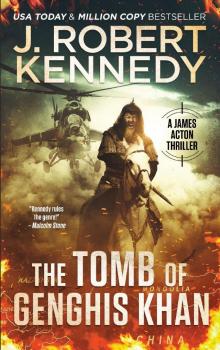 The Tomb of Genghis Khan
The Tomb of Genghis Khan_preview.jpg) Rogue Operator (A Special Agent Dylan Kane Thriller, Book #1)
Rogue Operator (A Special Agent Dylan Kane Thriller, Book #1) Forgotten
Forgotten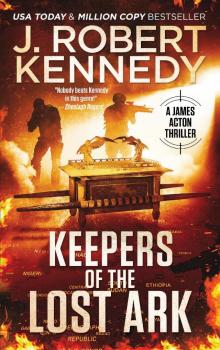 Keepers of the Lost Ark
Keepers of the Lost Ark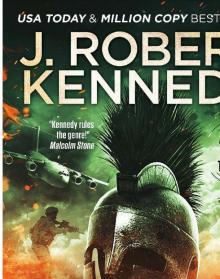 The Cylon Curse
The Cylon Curse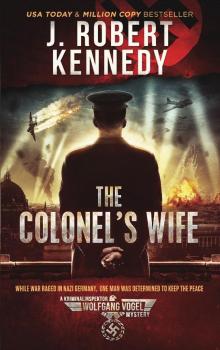 The Colonel's Wife
The Colonel's Wife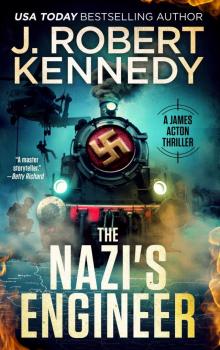 The Nazi's Engineer
The Nazi's Engineer Saint Peter's Soldiers (A James Acton Thriller, Book #14)
Saint Peter's Soldiers (A James Acton Thriller, Book #14)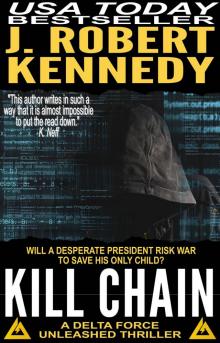 Kill Chain
Kill Chain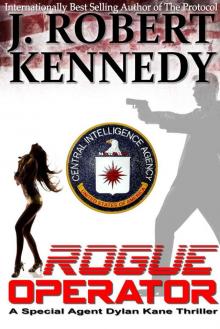 Rogue Operator
Rogue Operator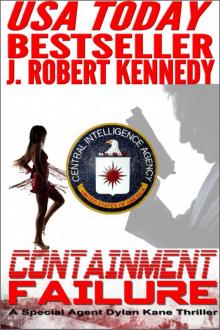 Containment Failure (A Special Agent Dylan Kane Thriller, Book #2)
Containment Failure (A Special Agent Dylan Kane Thriller, Book #2) The Lazarus Moment
The Lazarus Moment The Arab Fall (A James Acton Thriller, Book #6) (James Acton Thrillers)
The Arab Fall (A James Acton Thriller, Book #6) (James Acton Thrillers) Payback
Payback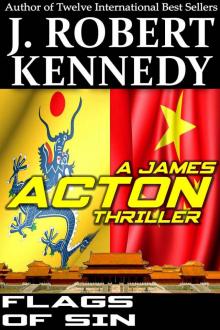 Flags of Sin - 05
Flags of Sin - 05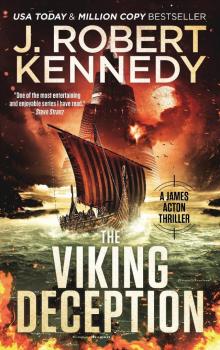 The Viking Deception
The Viking Deception The Templar's Revenge (A James Acton Thriller, #19) (James Acton Thrillers)
The Templar's Revenge (A James Acton Thriller, #19) (James Acton Thrillers)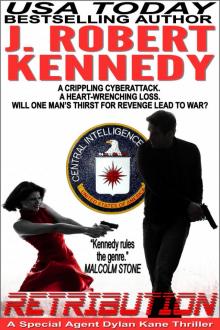 Retribution - A Special Agent Dylan Kane Thriller Book #7
Retribution - A Special Agent Dylan Kane Thriller Book #7 Tick Tock (A Detective Shakespeare Mystery, Book #2)
Tick Tock (A Detective Shakespeare Mystery, Book #2) Blood Relics (A James Acton Thriller, #12)
Blood Relics (A James Acton Thriller, #12) The Templar Detective
The Templar Detective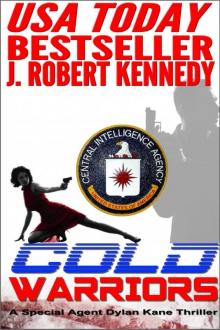 Cold Warriors (A Special Agent Dylan Kane Thriller, Book #3)
Cold Warriors (A Special Agent Dylan Kane Thriller, Book #3) Wages of Sin (A James Acton Thriller, #17) (James Acton Thrillers)
Wages of Sin (A James Acton Thriller, #17) (James Acton Thrillers) The Templar Detective and the Parisian Adulteress
The Templar Detective and the Parisian Adulteress Pompeii's Ghosts (A James Acton Thriller, #9)
Pompeii's Ghosts (A James Acton Thriller, #9) Raging Sun (A James Acton Thriller, #16) (James Acton Thrillers)
Raging Sun (A James Acton Thriller, #16) (James Acton Thrillers) The Riddle (A James Acton Thriller, Book #11)
The Riddle (A James Acton Thriller, Book #11)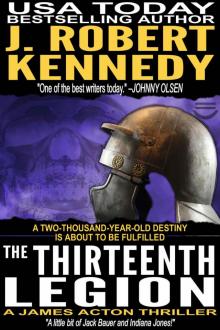 The Thirteenth Legion (A James Acton Thriller, #15) (James Acton Thrillers)
The Thirteenth Legion (A James Acton Thriller, #15) (James Acton Thrillers) Wrath of the Gods (A James Acton Thriller, #18) (James Acton Thrillers)
Wrath of the Gods (A James Acton Thriller, #18) (James Acton Thrillers) Sins of the Titanic (A James Acton Thriller, #13)
Sins of the Titanic (A James Acton Thriller, #13) Amazon Burning (A James Acton Thriller, #10)
Amazon Burning (A James Acton Thriller, #10)